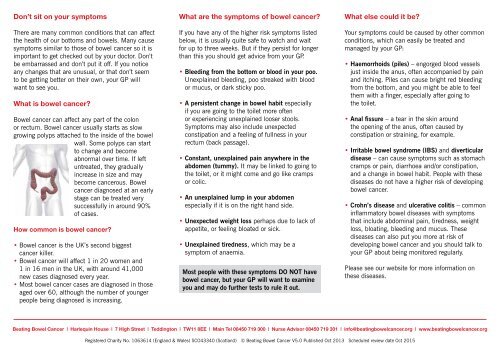Don't Sit on your Symptoms leaflet - Beating Bowel Cancer
Don't Sit on your Symptoms leaflet - Beating Bowel Cancer
Don't Sit on your Symptoms leaflet - Beating Bowel Cancer
Create successful ePaper yourself
Turn your PDF publications into a flip-book with our unique Google optimized e-Paper software.
D<strong>on</strong>’t sit <strong>on</strong> <strong>your</strong> symptoms<br />
There are many comm<strong>on</strong> c<strong>on</strong>diti<strong>on</strong>s that can affect<br />
the health of our bottoms and bowels. Many cause<br />
symptoms similar to those of bowel cancer so it is<br />
important to get checked out by <strong>your</strong> doctor. D<strong>on</strong>’t<br />
be embarrassed and d<strong>on</strong>’t put it off. If you notice<br />
any changes that are unusual, or that d<strong>on</strong>’t seem<br />
to be getting better <strong>on</strong> their own, <strong>your</strong> GP will<br />
want to see you.<br />
What is bowel cancer?<br />
<strong>Bowel</strong> cancer can affect any part of the col<strong>on</strong><br />
or rectum. <strong>Bowel</strong> cancer usually starts as slow<br />
growing polyps attached to the inside of the bowel<br />
wall. Some polyps can start<br />
to change and become<br />
abnormal over time. If left<br />
untreated, they gradually<br />
increase in size and may<br />
become cancerous. <strong>Bowel</strong><br />
cancer diagnosed at an early<br />
stage can be treated very<br />
successfully in around 90%<br />
of cases.<br />
How comm<strong>on</strong> is bowel cancer?<br />
• <strong>Bowel</strong> cancer is the UK’s sec<strong>on</strong>d biggest<br />
cancer killer.<br />
• <strong>Bowel</strong> cancer will affect 1 in 20 women and<br />
1 in 16 men in the UK, with around 41,000<br />
new cases diagnosed every year.<br />
• Most bowel cancer cases are diagnosed in those<br />
aged over 60, although the number of younger<br />
people being diagnosed is increasing.<br />
What are the symptoms of bowel cancer?<br />
If you have any of the higher risk symptoms listed<br />
below, it is usually quite safe to watch and wait<br />
for up to three weeks. But if they persist for l<strong>on</strong>ger<br />
than this you should get advice from <strong>your</strong> GP.<br />
• Bleeding from the bottom or blood in <strong>your</strong> poo.<br />
Unexplained bleeding, poo streaked with blood<br />
or mucus, or dark sticky poo.<br />
• A persistent change in bowel habit especially<br />
if you are going to the toilet more often<br />
or experiencing unexplained looser stools.<br />
<strong>Symptoms</strong> may also include unexpected<br />
c<strong>on</strong>stipati<strong>on</strong> and a feeling of fullness in <strong>your</strong><br />
rectum (back passage).<br />
• C<strong>on</strong>stant, unexplained pain anywhere in the<br />
abdomen (tummy). It may be linked to going to<br />
the toilet, or it might come and go like cramps<br />
or colic.<br />
• An unexplained lump in <strong>your</strong> abdomen<br />
especially if it is <strong>on</strong> the right hand side.<br />
• Unexpected weight loss perhaps due to lack of<br />
appetite, or feeling bloated or sick.<br />
• Unexplained tiredness, which may be a<br />
symptom of anaemia.<br />
Most people with these symptoms DO NOT have<br />
bowel cancer, but <strong>your</strong> GP will want to examine<br />
you and may do further tests to rule it out.<br />
What else could it be?<br />
Your symptoms could be caused by other comm<strong>on</strong><br />
c<strong>on</strong>diti<strong>on</strong>s, which can easily be treated and<br />
managed by <strong>your</strong> GP:<br />
• Haemorrhoids (piles) – engorged blood vessels<br />
just inside the anus, often accompanied by pain<br />
and itching. Piles can cause bright red bleeding<br />
from the bottom, and you might be able to feel<br />
them with a finger, especially after going to<br />
the toilet.<br />
• Anal fissure – a tear in the skin around<br />
the opening of the anus, often caused by<br />
c<strong>on</strong>stipati<strong>on</strong> or straining, for example.<br />
• Irritable bowel syndrome (IBS) and diverticular<br />
disease – can cause symptoms such as stomach<br />
cramps or pain, diarrhoea and/or c<strong>on</strong>stipati<strong>on</strong>,<br />
and a change in bowel habit. People with these<br />
diseases do not have a higher risk of developing<br />
bowel cancer.<br />
• Crohn’s disease and ulcerative colitis – comm<strong>on</strong><br />
inflammatory bowel diseases with symptoms<br />
that include abdominal pain, tiredness, weight<br />
loss, bloating, bleeding and mucus. These<br />
diseases can also put you more at risk of<br />
developing bowel cancer and you should talk to<br />
<strong>your</strong> GP about being m<strong>on</strong>itored regularly.<br />
Please see our website for more informati<strong>on</strong> <strong>on</strong><br />
these diseases.<br />
<strong>Beating</strong> <strong>Bowel</strong> <strong>Cancer</strong> | Harlequin House | 7 High Street | Teddingt<strong>on</strong> | TW11 8EE | Main Tel 08450 719 300 | Nurse Advisor 08450 719 301 | info@beatingbowelcancer.org | www.beatingbowelcancer.org<br />
Registered Charity No. 1063614 (England & Wales) SCO43340 (Scotland) © <strong>Beating</strong> <strong>Bowel</strong> <strong>Cancer</strong> V5.0 Published Oct 2013 Scheduled review date Oct 2015










